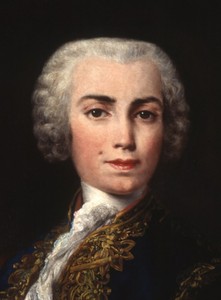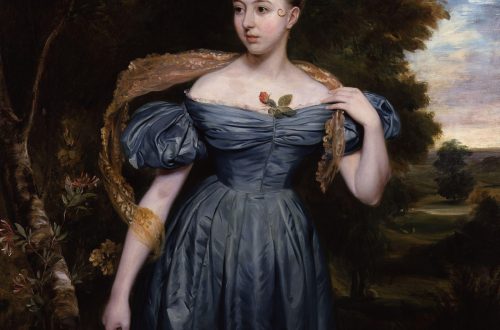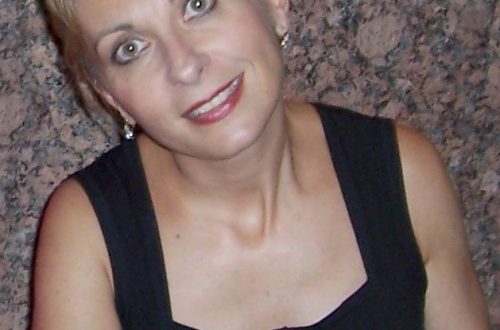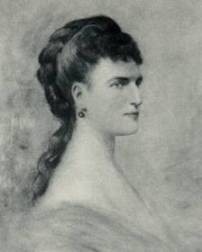
Farinelli |
Farinelli

The most outstanding musical singer, and probably the most famous singer of all time, is Farinelli.
“The world,” according to Sir John Hawkins, “has never seen two singers like Senesino and Farinelli on the stage at the same time; the first was a sincere and wonderful actor, and, according to sophisticated judges, the timbre of his voice was better than that of Farinelli, but the merits of the second were so undeniable that few would not call him the greatest singer in the world.
The poet Rolli, by the way, a great admirer of Senesino, wrote: “The merits of Farinelli do not allow me to refrain from admitting that he struck me. It even seemed to me that until now I had heard only a small part of the human voice, but now I heard it in its entirety. In addition, he has the most friendly and accommodating manner, and I really enjoyed talking with him.
But the opinion of S.M. Grishchenko: “One of the outstanding masters of bel canto, Farinelli had a phenomenal sound strength and range (3 octaves), a flexible, moving voice of a charmingly soft, light timbre and an almost infinitely long breathing. His performance was notable for its virtuoso skill, clear diction, refined musicality, extraordinary artistic charm, astonished by its emotional penetration and vivid expressiveness. He perfectly mastered the art of coloratura improvisation.
… Farinelli is an ideal performer of lyrical and heroic parts in the Italian opera series (at the beginning of his operatic career he sang female parts, later male parts): Nino, Poro, Achilles, Sifare, Eukerio (Semiramide, Poro, Iphigenia in Aulis ”, “Mithridates”, “Onorio” Porpora), Oreste (“Astianact” Vinci), Araspe (“Abandoned Dido” Albinoni), Hernando (“Faithful Luchinda” Porta), Nycomed (“Nycomede” Torri), Rinaldo (“Abandoned Armida” Pollaroli), Epitide (“Meropa” Throws), Arbache, Siroy (“Artaxerxes”, “Syroy” Hasse), Farnaspe (“Adrian in Syria” Giacomelli), Farnaspe (“Adrian in Syria” Veracini).
Farinelli (real name Carlo Broschi) was born on January 24, 1705 in Andria, Apulia. In contrast to the majority of young singers who are doomed to castration due to the impoverishment of their families, who saw this as a source of income, Carlo Broschi comes from a noble family. His father, Salvatore Broschi, was at one time the governor of the cities of Maratea and Cisternino, and later the bandmaster of Andria.
An excellent musician himself, he taught the art to his two sons. The eldest, Ricardo, subsequently became the author of fourteen operas. The youngest, Carlo, early showed wonderful singing abilities. At the age of seven, the boy was castrated in order to preserve the purity of his voice. The pseudonym Farinelli comes from the names of the Farin brothers, who patronized the singer in his youth. Carlo studied singing first with his father, then at the Neapolitan Conservatory “Sant’Onofrio” with Nicola Porpora, the most famous teacher of music and singing at that time, who trained such singers as Caffarelli, Porporino and Montagnatza.
At the age of fifteen, Farinelli made his public debut in Naples in Porpora’s opera Angelica and Medora. The young singer became widely known for his performances at the Aliberti Theater in Rome in the 1721/22 season in the operas Eumene and Flavio Anichio Olibrio by Porpora.
Here he sang the main female part in Predieri’s opera Sofonisba. Every evening, Farinelli competed with the trumpeter in the orchestra, accompanying him singing in the most bravura tone. C. Berni tells about the exploits of the young Farinelli: “At the age of seventeen, he moved from Naples to Rome, where, during the performance of one opera, he competed every evening with the famous trumpeter in the aria, which he accompanied on this instrument; at first it seemed only a simple and friendly contest, until the spectators became interested in the dispute and divided into two parties; after repeated performances, when they both built the same sound with all their might, showing the power of their lungs and trying to outdo each other with brilliance and strength, they once milled the sound with a trill to a third for such a long time that the audience began to look forward to exodus, and both seemed completely exhausted; and indeed, the trumpeter, completely exhausted, stopped, assuming that his opponent was equally tired and that the match ended in a draw; then Farinelli, smiling as a sign that up to now he had only joked with him, began, in the same breath, with renewed vigor, not only to mill the sound in trills, but also to perform the most difficult and fastest embellishments until he finally forced to stop the applause of the audience. This day can date the beginning of his unchanging superiority over all his contemporaries.
In 1722, Farinelli performed for the first time in Metastasio’s opera Angelica, and since then there was his cordial friendship with the young poet, who called him nothing more than “caro gemello” (“dear brother”). Such relations between the poet and “music” are characteristic of this period in the development of Italian opera.
In 1724, Farinelli performed his first male part, and again success throughout Italy, which at that time knew him under the name Il Ragazzo (Boy). In Bologna, he sings with the famous musico Bernacchi, who is twenty years older than him. In 1727, Carlo asks Bernacchi to give him singing lessons.
In 1729, they sing together in Venice with castrato Cherestini in L. Vinci’s opera. The following year, the singer triumphantly performs in Venice in his brother Ricardo’s opera Idaspe. After the performance of two virtuoso arias, the audience goes into a frenzy! With the same brilliance, he repeats his triumph in Vienna, in the palace of Emperor Charles VI, increasing his “vocal acrobatics” to dazzle His Majesty.
The emperor very friendly advises the singer not to get carried away with virtuoso tricks: “These gigantic leaps, these endless notes and passages, ces notes qui ne finissent jamais, are only amazing, but the time has come for you to captivate; you are too extravagant in the gifts with which nature showered you; if you want to reach the heart, you must take the smoother and simpler path.” These few words almost completely changed the way he sang. From that time on, he combined the pathetic with the living, the simple with the sublime, thereby delighting and astonishing listeners in equal measure.
In 1734 the singer came to England. Nicola Porpora, in the midst of his struggle with Handel, asked Farinelli to make his debut at the Royal Theater in London. Carlo chooses the opera Artaxerxes by A. Hasse. He additionally includes in it two arias of his brother that were successful.
“In the famous aria “Son qual nave,” composed by his brother, he began the first note with such tenderness and gradually increased the sound to such amazing power, and then weakened it in the same way towards the end that they applauded him for five whole minutes,” notes Ch. Bernie. – After that, he showed such brilliance and speed of passages that the violinists of that time could hardly keep up with him. In short, he was as superior to all other singers as the famous horse Childers was superior to all other racehorses, but Farinelli was distinguished not only by mobility, he now combined the advantages of all great singers. There was power, sweetness, and range in his voice, and tenderness, grace, and speed in his style. He certainly possessed qualities unknown before him and not found after him in any human being; qualities irresistible and subdued every listener – a scientist and an ignoramus, a friend and an enemy.
After the performance, the audience shouted: “Farinelli is God!” The phrase flies all over London. “In the city,” writes D. Hawkins, “the words that those who have not heard Farinelli sing and have not seen Foster play are unworthy to appear in decent society have literally become a proverb.”
Crowds of admirers gather at the theater, where the twenty-five-year-old singer receives a salary equal to the salary of all the members of the troupe put together. The singer received two thousand guineas a year. In addition, Farinelli earned large sums in his benefit performances. For example, he received two hundred guineas from the Prince of Wales, and 100 guineas from the Spanish ambassador. In total, the Italian grew rich in the amount of five thousand pounds in a year.
In May 1737, Farinelli went to Spain with the firm intention of returning to England, where he entered into an agreement with the nobility, who then ran the opera, for performances for the next season. On the way, he sang for the King of France in Paris, where, according to Riccoboni, he charmed even the French, who at that time generally hated Italian music.
On the day of his arrival, the “musico” performed before the King and Queen of Spain and did not sing in public for many years. He was given a permanent pension of about £3000 a year.
The fact is that the Spanish queen invited Farinelli to Spain with a secret hope to bring her husband Philip V out of a state of depression bordering on insanity. He constantly complained of terrible headaches, locked himself in one of the rooms of the La Granja Palace, did not wash and did not change linen, considering himself dead.
“Philip was shocked by the very first aria performed by Farinelli,” British Ambassador Sir William Coca reported in his report. – With the end of the second, he sent for the singer, praised him, promising to give him everything he wanted. Farinelli asked him only to get up, wash, change clothes and hold a cabinet meeting. The king obeyed and has been recovering ever since.”
After that, Philip every evening calls Farinelli to his place. For ten years, the singer did not perform in front of the public, as every day he sang four favorite arias to the king, two of which were composed by Hasse – “Pallido il sole” and “Per questo dolce amplesso”.
Less than three weeks after arriving in Madrid, Farinelli is appointed court singer of the king. The monarch clarified that the singer submits only to him and the queen. Since then, Farinelli has enjoyed great power at the Spanish court, but never abuses it. He seeks only to alleviate the illness of the king, protect the artists of the court theater and make his audience love Italian opera. But he cannot cure Philip V, who dies in 1746. His son Ferdinand VI, born of his first marriage, succeeds to the throne. He imprisons his stepmother in the palace of La Granja. She asks Farinelli not to leave her, but the new king demands that the singer stay at court. Ferdinand VI appoints Farinelli director of the royal theatres. In 1750, the king awards him the Order of Calatrava.
The duties of an entertainer are now less monotonous and tedious, as he has persuaded the monarch to start an opera. The latter was a great and joyful change for Farinelli. Appointed as the sole director of these performances, he ordered from Italy the best composers and singers of that time, and Metastasio for the libretto.
Another Spanish king, Charles III, having taken the throne, sent Farinelli to Italy, showing how embarrassment and cruelty were mixed with the veneration of castrati. The king said: “I only need capons on the table.” However, the singer continued to be paid a good pension and was allowed to take out all his property.
In 1761, Farinelli settled in his luxurious house in the vicinity of Bologna. He leads the life of a wealthy man, satisfying his inclinations towards the arts and sciences. The singer’s villa is surrounded by a magnificent collection of snuffboxes, jewelry, paintings, musical instruments. Farinelli played the harpsichord and viola for a long time, but he sang very rarely, and then only at the request of high-ranking guests.
Most of all, he loved to receive fellow artists with the courtesy and refinement of a man of the world. All of Europe came to pay homage to what they considered the greatest singer of all time: Gluck, Haydn, Mozart, Emperor of Austria, Saxon princess, Duke of Parma, Casanova.
In August 1770 C. Burney writes in his diary:
“Every music lover, especially those who were lucky enough to hear Signor Farinelli, will be pleased to know that he is still alive and in good health and spirit. I found that he looks younger than I expected. He is tall and thin, but by no means frail.
… Signor Farinelli has not sung for a long time, but still has fun playing the harpsichord and viola lamour; he has many harpsichords made in different countries and named by him, depending on his appreciation of this or that instrument, by the names of the greatest Italian artists. His greatest favorite is a pianoforte made in Florence in 1730, on which is written in gold letters “Raphael d’Urbino”; then come Correggio, Titian, Guido, and so on. He played his Raphael for a long time, with great skill and subtlety, and himself composed several elegant pieces for this instrument. The second place goes to the harpsichord given to him by the late Queen of Spain, who studied with Scarlatti in Portugal and Spain… Signor Farinelli’s third favorite is also made in Spain under his own direction; it has a movable keyboard, like that of the Count Taxis in Venice, in which the performer can transpose the piece up or down. In these Spanish harpsichords, the main keys are black, while the flat and sharp keys are covered with mother-of-pearl; they are made according to Italian models, entirely of cedar, except for the soundboard, and placed in a second box.
Farinelli died on July 15, 1782 in Bologna.





